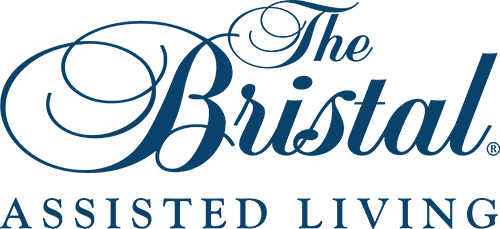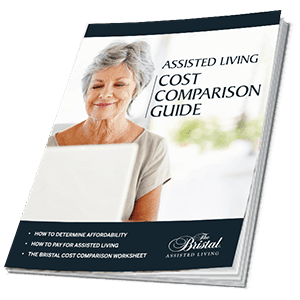Here’s your complete guide to assisted living — what it is, who may be a good fit for it, how much it costs, and more.
The Cost of Assisted Living
We frequently find that one of the first questions people ask is, “What does assisted living cost?”
If you search that question, you’ll see one common answer popping up over and over again: It depends. Frustrating, we know — you just want a straight answer.
The truth is that costs can vary based on location, apartment size, and level of care required, so it is difficult to give an exact dollar amount. Genworth Financial’s Cost of Care Survey is a great resource that can provide a general idea of what assisted living costs.
At The Bristal Assisted Living, prices vary by location and suite type. Monthly rent includes luxury services and amenities, such as housekeeping, laundry, a daily calendar of events, and meals. An Individual Service Plan (ISP) providing personal care needs can be added for an additional fee, based on the services needed. Get The Bristal cost guide below or contact the community of your choice to find out more about pricing options just for you.
Assisted Living Cost Comparison Guide
Get a free guide on assisted living costs and learn about payment options.
We recommend that you contact the community of your choice to find out just how affordable an apartment at The Bristal can be.
How to Pay for Assisted Living
There are a few ways people usually pay for assisted living: Private funds, long-term care insurance, veterans benefits, or Medicaid. Since licensed assisted living communities follow state guidelines, they typically are limited in the amount of specialized medical care they can provide, if any, so Medicare usually does not cover the cost.
- Private Funds: Many people pay through private means, whether that be personal investment portfolios, savings accounts, pensions, or the profits from a home sale.
- Long-Term Care Insurance: If you have long-term care insurance, it may be able to cover assisted living. Most policies have restrictions in place, so it’s best to call the insurance company with any questions.
- Veterans Benefits: The Veterans Administration’s Aid and Attendance (A&A) pension has benefits that cover a veteran or veteran’s spouse who needs regular assistance. Assisted living falls under this benefit.
- Medicaid: Medicaid covers assisted living costs, though the coverage, financial aid, and eligibility of a person differ from state to state. Additionally, not all communities accept Medicaid. Note: By contrast, Medicare does not usually cover the cost of assisted living.
The Benefits of Assisted Living
There are many benefits to assisted living. Here are just a few:
- Peace of mind. Most assisted living communities offer emergency response and security systems campus-wide. If anything should happen to your parent, someone will be there to take care of them. No more worrying in the middle of the night whether they’ve fallen or not; no more wondering why they aren’t picking up the phone.
- Quality care. At an assisted living community, your parent will have the assistance they need as they go about their day, from their first cup of coffee to their nighttime routine. They’ll still have agency to act on their own, but at the same time they’ll have help with things such as medication management, bathing, or dressing.
- Lifestyle options. Of course, your parent is more than their health needs. The assisted living communities of today are focused on offering social events, cultural programs, group outings, gourmet dining, and even professional entertainment. Residents can be as social as they want and are free to do as they please.

What is Assisted Living?
Assisted living is a type of senior housing that allows residents to maintain their independence, but provides support services to older adults who need help with a few activities of daily living (ADLs).
Assisted living is for seniors who can live on their own, but either choose not to, or require a little assistance each day. Residents in an assisted living community don’t require the medical attention provided by a nursing home, but they may need a helping hand from time to time, day or night.
Licensed assisted living communities are regulated by the State Department of Health – and all communities of The Bristal Assisted Living are licensed communities.
ADLs: A Closer Look
Activities of daily living are basic everyday self-care tasks. They include:
- Bathing
- Dressing
- Grooming
- Eating
- Toileting
- Transferring
Who Needs Assisted Living?
As we touched on above, assisted living is a good fit for seniors who need assistance with one or more ADLs. Assisted living is not for people who need 24/7 medical care. Rather, it’s for people who (as the name implies) need assistance in their daily life.
Seniors who choose to live in an assisted living community often benefit in other ways as well. For example, in most assisted living communities, meals are prepared and served each day, laundry and housekeeping are done for the residents, and there is a calendar packed with programs and events all day.
In fact, many seniors choose to move to assisted living communities just for the services, amenities, and social benefits, and they rest easy knowing that assistance is available should they need it in the future.
Many adult children have questions about how to tell if their parent is a good fit for assisted living because they worry about them living alone. One way of answering that question on your own is to look at all the different aspects of your parent’s day-to-day routine, and see if they could benefit from living in an assisted living community.
Is housework becoming a little too overwhelming for your loved one? Do you feel they would benefit from socializing more within a community? Do they struggle with one or more ADLs each day? Would having their meals prepared and served restaurant-style each day make their life easier? Would you rest easier knowing that your parent is in a place where there is always someone there for them?

Does My Parent Need Assisted Living?
Still not sure if your parent needs assisted living? Let’s go over a few example scenarios to help clear things up:
SCENARIO #1

Mary
Mary has been losing weight without meaning to, and her son has noticed that the house is looking a bit untidy, which is unusual for her. When he visits or calls, he makes a habit of asking her if she has taken her medications. More and more, she answers that she forgot to take them.
Is Mary a good fit?
Yes. Most important, in an assisted living community, Mary could receive help with medication management. Meals would also be provided, and the housekeeping (which it turns out she’s been putting off because she can’t physically handle it anymore) would be taken care of for her.
SCENARIO #2

Richard
Richard suffered a fall and hospitalization about three months ago. He has since recovered, but his children are worried. He’s a bit unsteady on his feet, and although he insists he’s fine, they’ve noticed that he has issues getting around the house and dressing himself. He used to love being out and about, but now he’s always at home.
Is Richard a good fit?
Yes. When mobility becomes a concern, assisted living can be a good fit. The suites are designed with senior needs in mind, and there’s a trained, professional staff available around the clock in the event of a fall, or if Richard needs help getting dressed in the mornings. Additionally, there will be plenty of programs to get him back to his social self.
SCENARIO #3

Dottie
Dottie’s daughter has noticed recently that Dottie isn’t cooking anymore. She usually goes out to eat or heats up frozen meals. Also, the house is getting messy. When her daughter asks her if everything’s okay, Dottie is dismissive and says she just doesn’t bother with it anymore.
Is Dottie a good fit?
Yes, though Dottie may be a better fit for independent living. That’s a great option for self-sufficient seniors who are looking to free themselves of the hassles of homeownership and would rather enjoy convenient living at a community that provides delicious dining, a wide range of services, and enriching programs. Independent living is an option at all of The Bristal communities, and should Dottie ever need assistance in the future, that is an always-available option.
Researching assisted living? We have resources that can help.
Assisted Living Frequently Asked Questions
Still have unanswered questions? These frequently asked questions should help tie up any loose ends.
Generally, an assisted living community provides three meals a day, laundry and housekeeping services, scheduled programs and outings, apartment-style living options, assistance with ADLs, and wellness programs.
No. Most assisted living communities are private-pay only, although some states allow the use of Medicaid funds to pay for assisted living care.
The majority of residents in assisted living communities pay for housing and services with private funds generated through the sale of the resident’s home, personal income, and/or family support. Alternative financial resources may be available from long-term care insurance policies. For former military personnel and their spouses, there may be assistance available through the Veterans Administration.
Some communities make it easier for couples to live together than others – it depends on the community.
At The Bristal Assisted Living communities, the answer is “absolutely.” In fact, we have many couples living at The Bristal.
There are one- and two-bedroom options in our communities, comfortable enough for two. The cost for couples would include the standard rent, plus a fee for the second person since there would be two people enjoying meals, amenities, programs, laundry services, and so on. And with individualized service plans, each resident can receive any care that they may need.
In short, the answer is: the amount of medical care needed by the resident. Assisted living communities may offer some medical services, but they’re more for providing assistance with ADLs for seniors with minor to moderate health needs, and are licensed as such. The focus of skilled nursing is more on 24/7 care, with a focus that’s much more medical in nature. They’re what most people would think of as a nursing home and are meant for seniors with serious health issues.
Learn More About Assisted Living at The Bristal
At The Bristal, we understand that residents want to continue leading their individual, independent lives. We’re there to help make that happen by offering assistance when they need it and plenty of convenient services and luxury amenities to help them live happier, healthier lives.
You can learn more about The Bristal by reading our blog, signing up for our newsletter or contacting us for more information.

